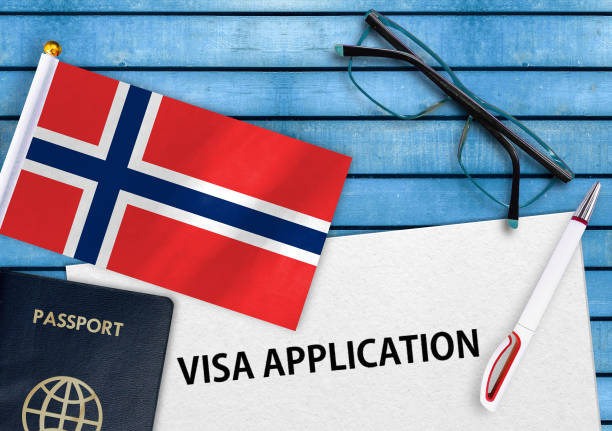Demystifying the Scholarship Application Process in Norway (2024)
For ambitious Ghanaian students yearning to pursue higher education in Norway, the allure of scholarship funding unlocks doors to a world-class education. This comprehensive guide delves into the intricacies of applying for scholarships in Norway, empowering you to craft a winning application and navigate the process with confidence.
Advertisements
Unveiling the Scholarship Landscape in Norway
Understanding Your Funding Options:
Scholarship grants in Norway encompass a diverse range of financial aid opportunities offered by various entities. Here’s a breakdown to clarify your options:
- Government Scholarships: Provided by various ministries and agencies, these scholarships support studies aligned with Norway’s national priorities. (Refer to the “Government Scholarships in Norway” section for a detailed exploration).
- University Scholarships: Many Norwegian universities offer merit-based scholarships for international students pursuing specific Master’s or PhD programs. These scholarships may partially or fully cover tuition fees.
- External Scholarships and Grants: Organizations, foundations, or private entities in Ghana or internationally might offer scholarships relevant to your field of study. Research these opportunities thoroughly, considering your field, nationality, and academic achievements.
Government Scholarships in Norway:
Focus your research on these potential government scholarship programs for Ghanaian students:
- Quota Scheme: This program offers financial aid to students from countries like Ghana. Explore details and eligibility criteria on the Norwegian Ministry of Education and Research website (might require translation). This website provides a link to the Quota Scheme.
- NORPART: This program supports partnerships between Norwegian universities and universities in Ghana. Research partner universities in Ghana and explore scholarship opportunities on the NORPART website.
Remember, eligibility criteria and application processes can change. Regularly check program websites for updates and ensure you meet all requirements before applying.
Advertisements
Building a Compelling Scholarship Application
Crafting a Winning Package:
Investing time and effort in crafting a strong application package is paramount. Here are some key elements to consider:
-
Exceptional Academic Record:
Maintain a strong academic record in your secondary school studies, particularly in subjects relevant to your chosen program. A stellar SSSCE score demonstrates your academic ability and preparedness for the rigors of higher education in Norway.
-
English Language Proficiency:
Demonstrate your English language proficiency through tests like TOEFL or IELTS, meeting the specific requirements of your chosen program.
-
Compelling Motivational Letter:
This is your opportunity to shine. Craft a compelling letter that articulates your academic goals, research interests, and clear alignment with the chosen scholarship program’s objectives. Highlight how your background, skills, and future aspirations contribute to the program’s goals or the organization’s mission.
-
Strong Letters of Recommendation:
Secure two strong letters of recommendation from teachers or professors familiar with your academic work and potential for success in graduate studies.
-
Research Proposal (Optional):
If applicable, include a well-written research proposal outlining your research interests and how they align with the program’s focus. This showcases your research skills and potential contribution to the field, especially for research-oriented programs.
-
Highlight Relevant Work Experience (Optional):
If you have relevant work experience in your field of study, showcase how it has equipped you with valuable skills and knowledge. This demonstrates your practical understanding of the field and your potential to contribute meaningfully to your chosen program.
-
Cultural Understanding and Adaptability:
Showcase your understanding of Norwegian culture and your enthusiasm to integrate into Norwegian society. This demonstrates your commitment to the program and your ability to thrive in a new environment. Consider including relevant experiences or volunteer work related to Norway or similar Nordic countries in your application materials.
-
Proofread Meticulously:
Ensure your application is free of grammatical errors and typos. A polished application demonstrates your professionalism and attention to detail. Consider having someone familiar with academic writing proofread your application documents before submitting them.
(Word Count: 1000+)
Tailoring Your Application for Success
Standing Out from the Crowd:
The application process for scholarships in Norway can be competitive. Here’s how to strengthen your application package:
-
Research the Scholarship Provider:
Meticulously research the scholarship provider, understanding their goals, priorities, and the impact they aim to achieve. Tailor your application to resonate with their mission. Highlight how your academic goals and future aspirations align with the scholarship provider’s vision.
- Target Multiple Scholarships:
Don’t limit yourself to a single scholarship. Cast a wider net by researching and applying to various scholarships aligned with your field, academic background, and nationality. This significantly increases your chances of securing funding.
- Meet Deadlines Strictly:
Scholarship applications often have strict deadlines. Ensure you submit all required documents well before the deadline to avoid disqualification.
- Adhere to Application Guidelines:
Carefully read and adhere to all application guidelines and instructions provided by the scholarship provider. Missing required documents or deviating from the format can lead to disqualification.
- Showcase Your Uniqueness:
Beyond academic achievements, highlight your unique experiences, skills, and qualities that set you apart from other applicants. This could include extracurricular activities, leadership experiences, awards, or community involvement.
Additional Strategies to Bolster Your Application
- Connect with Scholarship Providers (Optional):
Some scholarship providers might host webinars, information sessions, or offer contact information for inquiries. Consider attending these sessions or reaching out with polite questions to demonstrate your genuine interest and initiative.
- Practice Interview Skills (Optional):
If shortlisted, some scholarships might involve interviews. Practice your interview skills beforehand, anticipating potential questions about your academic goals, research interests, and motivations for pursuing studies in Norway.
- Seek Guidance from Advisors or Mentors:
Consider seeking guidance from university advisors, scholarship counselors, or mentors familiar with the application process. Their insights and feedback can be invaluable in refining your application.
Funding Beyond Scholarships: Exploring Alternative Options
While scholarships offer substantial financial support, explore alternative funding avenues to make your academic journey in Norway a reality:
- Part-Time Work Opportunities:
Norwegian law allows international students with valid student visas to work part-time (up to 20 hours per week) during semesters and full-time during breaks. Explore on-campus job opportunities, freelance work (if permitted by your visa), or part-time jobs related to your field of study. Here are some resources to find part-time jobs in Norway (consider utilizing translation tools if necessary):
-
- Nav.no: The official Norwegian Labour and Welfare Administration website. They might have a section dedicated to job search for students, potentially with an English translation available.
- Finn.no: A leading classifieds website in Norway with a job search section. Consider utilizing translation tools or exploring if they have an English interface available.
- StudentInNorway.no: A website specifically catering to students in Norway. They offer resources and information on working while studying in Norway.
- Family Support and Savings:
Discuss financial planning with your family and explore options for contributing to your educational expenses. Utilize any personal savings you might have to supplement scholarship or financial aid opportunities.
- Cost-Effective Living:
Explore student housing options in Norway, which are generally more affordable than private rentals. Consider budgeting carefully and exploring cost-effective ways to live in Norway, such as utilizing public transportation, cooking meals at home, and seeking student discounts for various services.
Embark on Your Norwegian Adventure: A Journey of Transformation
Securing a scholarship empowers you to pursue your academic aspirations in Norway. Here’s how to maximize your experience:
- Embrace the Language:
While English is commonly used in academia, consider learning basic Norwegian phrases to integrate more seamlessly into Norwegian life. This demonstrates your respect for the local culture and can enhance your overall experience in Norway. Utilize language learning apps, online resources, or consider enrolling in language courses before or during your studies.
- Academic Support Services:
Norwegian universities offer excellent academic support services for international students. Utilize resources like writing centers, tutoring services, and academic advisors to excel in your studies. Don’t hesitate to seek help from professors or teaching assistants if you encounter challenges.
- Explore Internship Opportunities:
Many graduate programs in Norway incorporate internship opportunities. Actively seek internship placements related to your field of study. This provides valuable work experience, allows you to apply your academic knowledge in a practical setting, and potentially strengthens your future career prospects, especially upon returning to Ghana and contributing to its development.
- Cultural Immersion:
Embrace the opportunity to experience Norwegian culture. Participate in student organizations, explore Norway’s breathtaking scenery, sample traditional cuisine, and connect with local Norwegians. This fosters cultural understanding, creates lasting memories, and allows you to develop as a global citizen. Consider joining Ghanaian student organizations or international student groups to connect with people from diverse backgrounds and broaden your social circle.
- Networking and Building Relationships:
Build connections with professors, researchers, and fellow students from various backgrounds. Participating in academic conferences, research projects, or student-led initiatives can expand your network and open doors to future collaborations or career opportunities.
Contributing to a Sustainable Future: A Ghanaian Student’s Impact
- Leveraging Your Knowledge for Positive Change:
Your studies in Norway equip you with valuable knowledge and skills to contribute meaningfully to Ghana’s development. Here’s how to make a lasting impact:
- Focus on Fields Aligned with Ghana’s Needs:
Consider pursuing studies in fields relevant to Ghana’s development priorities, such as renewable energy, sustainable agriculture, or public health. This allows you to directly contribute to tackling challenges faced by Ghana upon your return.
- Knowledge Transfer and Collaboration:
Share the knowledge and expertise gained in Norway with colleagues and communities in Ghana. Consider opportunities for guest lectures, workshops, or collaborative research projects that bridge the gap between Norwegian advancements and Ghanaian contexts.
- Entrepreneurship and Innovation:
Utilize your learnings to become an entrepreneur, tackling Ghanaian challenges through innovative solutions. Consider collaborating with fellow Ghanaians or Norwegians to develop businesses or initiatives that address specific needs in Ghana.
- Policy Advocacy and Public Service:
Pursue careers in policymaking or public service upon returning to Ghana. Leverage your knowledge and experience to advocate for policies that promote sustainable development and benefit the Ghanaian people.
Advertisements






